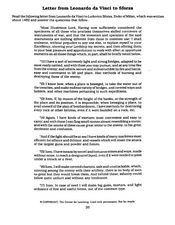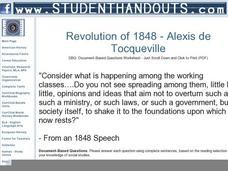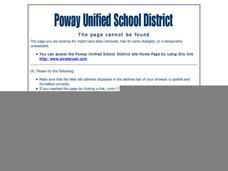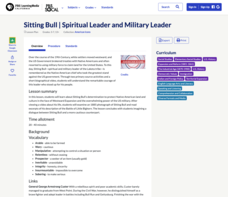American Battlefield Trust
1864-1865: Bringing the War to an End
The Civil War—in its breathtaking ferocity—came to a close in 1864. However, turmoil echoed throughout the country's politics, including the presidential context between Lincoln and McClellan. Performing chronology and primary source...
National Woman's History Museum
Defying Expectations: Unsung Hero: Marsha P. Johnson and the Stonewall Riots
The 1960s were a turbulent time, but the charismatic figure of Marshal P. Johnson is often left out of the provocative stories of the era. With primary sources that talk about Johnson and her role in the Stonewall Riots, scholars unpack...
Center for History Education
Methods of Reform: The Lowell Mill Girls
Although the girls and women who worked in the Lowell Mills are not often seen this way, they are the forbearers of the American labor movement. Pupils examine primary sources, including testimony about life at Lowell and labor laws, as...
US National Archives
WWII: Asia 1939-45 – Singapore
The fall of Singapore in World War II was shocking news for the Allied forces—but why? High schoolers explore primary source documents and videos to determine why February 15, 1942 was a wake-up call to the British Empire and its allies...
Benjamin Franklin Tercentenary
Reading the Work of B. Franklin, Printer
Placing Ben Franklin’s ideas about a free press next to those embodied in the First Amendment sheds light on both. Learners interpret and compare two primary sources and then examine them in the light of a contemporary survey about...
National Endowment for the Humanities
How to Win a World War
High schoolers are have begun to learn the art of diplomacy with each other, but do they understand how diplomacy works at a global level? The second in a series of four lessons, guides scholars in evaluating primary sources. The why...
Council for Economic Education
Business in the Middle Ages: Working in a Guild
Long before modern labor unions, guilds worked to ensure that workers had a fair wage. But, in medieval Europe, they also cooperated with the government. Using a simulation and primary source analysis, young scholars become hatters in...
Curated OER
Propaganda, WWII, Ghetto‘s, and Analysis of Primary Resources
Students consider the implications of anti-Semitism. In this World War II lesson, students examine selected documents and images featuring the propaganda that promoted Jewish persecution. Students write essays that highlight how the Nazi...
Curated OER
Ancient Babylon
Authenticate an ancient civilizations study by having historians analyze primary source artifacts. After examining an image of a Babylonian king votive statue, pupils read a short background context. They then answer 3 questions based on...
Curated OER
The Impact of the Civil Rights Movement
Deepen understanding of the Civil Rights Movement with this collection of primary documents. This resource contains 22 video transcripts about desegregation, voting rights, black power, Dr. Martin Luther King Jr., and more. You might...
Curated OER
Analyzing The Maryland Gazette,October 10, 1765
Can you access a copy of The Maryland Gazette dated October 10, 1765? Although no link to the document is provided in this lesson, the questions on the worksheet do lead researchers through the steps necessary to form an analysis of a...
Curated OER
Many Passages: The Voyage of the Slave Ship Brookes
Examine three perspectives of the slave trade - captain, sailor, and captive - through this collaborative analysis activity. Small groups study one perspective with a primary source to analyze. They discern what is a historical fact and...
Curated OER
Analyzing "Do Not Tax the Colonies"
In this primary source research worksheet, students examine a copy of "Do Not Tax the Colonies," (not included) and respond to 6 short answer questions regarding its content.
Curated OER
Letter from Leonardo da Vinci to Sforza
Expose your class to words directly from Leonardo da Vinci with this primary source document. Learners analyze the document, a letter from Leonardo da Vinci to Ludovico Sforza, the Duke of Milan, and respond to 3 short answer questions....
Curated OER
Examining Jesus' Teachings
Simplify your study of Christianity with this "back to the basics" worksheet. Scholars examine a primary source excerpt from the Gospel according to Luke and consider Jesus' teachings. They assess which other belief system has similar...
Curated OER
Revolution of 1848 - Alexis de Tocqueville
Document-based questions are a great way to increase understanding of a primary source document or prepare learners for a class discussion. Here, they'll read an excerpt from Alexis de Tocqueville's speech regarding the revolution of...
Curated OER
Legacy of the Dust Bowl: Dust Storm Media 1930s
Some learners might not realize that the term dust bowl was not figurative. Show the reality of 1930s America with eight primary source photographs. Slides depict images of dust storms or their aftermath.
Curated OER
The Dust Bowl: Images
Introduce learners to the hardships that followed the onset of the Dust Bowl. There is a quote taken from The Dust Bowl, Men, Dirt and Depression by Paul Bonnifield followed by 10 primary-source images.
National Endowment for the Humanities
A Debate Against Slavery
Slavery is a serious topic that can be challenging for middle schoolers to study. Young scholars can see firsthand through primary sources what occurred during that time period in the United States. The third of five lessons provides...
Friends of Fort McHenry
Privateers in the War of 1812: Soldiers or Thieves?
Do governments have the right to authorize individuals to perform illegal acts during times of war? Did the US government really employ pirates? Use the War of 1812 as your vessel to answering these questions through class discussion and...
PBS
Sitting Bull: Spiritual Leader and Military Leader
Sitting Bull was not expected to be a great warrior. Yet, he led the Lakota people and other tribes to several pivotal victories against the United States government when federal troops threatened their land. Using primary sources, such...
University of California
Impact of the California Missions on Native Americans
While the Spanish claimed to bring civilization to California indigenous peoples, in reality, they also brought violence and forced assimilation to European values. Primary sources, such as the reports of Catholic priests and Europeans...
National Endowment for the Humanities
Women's Lives Before the Civil War
Women's lifestyles before the Civil War made a huge impact as a point of causation. Give middle schoolers the opportunity to view firsthand the lives of women before the Civil War. They analyze primary source documents, view photographs,...
Friends of Fort McHenry
Was the War of 1812 Our Second War of Independence?
Though it occurred almost 40 years later, could the United States have been fighting for their independence again in the War of 1812? Using appropriate primary source material from each of the two wars, compare and contrast the situation...
Other popular searches
- Using Primary Sources
- Wwi, Primary Sources
- Rosa Parks Primary Documents
- Gilded Age Primary Sources
- Working With Primary Sources
- Primary Resources Hsie
- Web Quests Primary Sources
- Ancient Rome Primary Sources
- 1920 1929 Primary Sources
- Primary Sources and Family
- Conscription Primary Sources
- Scotland Primary Sources

























